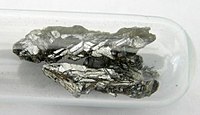
Photo from wikipedia
Roxarsone (ROX), an organoarsenic feed additive, and its metabolites, can be present in animal manure used to fertilize rice. Rice is prone to absorb arsenic, and is subject to straighthead… Click to show full abstract
Roxarsone (ROX), an organoarsenic feed additive, and its metabolites, can be present in animal manure used to fertilize rice. Rice is prone to absorb arsenic, and is subject to straighthead disorder, which reduces rice yield and is linked with organic arsenic compounds. This study aims to elucidate how soil property affect arsenic accumulation in rice plants fertilized with chicken manure containing ROX metabolites. Manures of chickens fed without or with ROX, designated as control manure and ROX treated manure (ROXCM), respectively, were applied in eight paddy soils of different origins, to investigate the assimilation of arsenic species in rice plants. The results show that inorganic arsenic (arsenate and arsenite), monomethylarsonic acid and dimethylarsinic acid (DMA) were detected in all brown rice and husk, trace tetramethylarsonium and trimethylarsine oxide were occasionally found in these both parts, whereas all these arsenic species were determined in straw, irrespective of manure type. ROXCM application specifically and significantly increased brown rice DMA (P = 0.002), which remarkably enhanced the risk of straighthead disease in rice. Although soil total As impacted grain biomass, soil free-iron oxides and pH dominated arsenic accumulation by rice plants. The significantly increased grain DMA suggests manure bearing ROX metabolites is not suitable to be used in soils with abundant free-iron oxides and/or high pH, if straighthead disorder is to be avoided in rice.
Journal Title: Ecotoxicology and environmental safety
Year Published: 2019
Link to full text (if available)
Share on Social Media: Sign Up to like & get
recommendations!